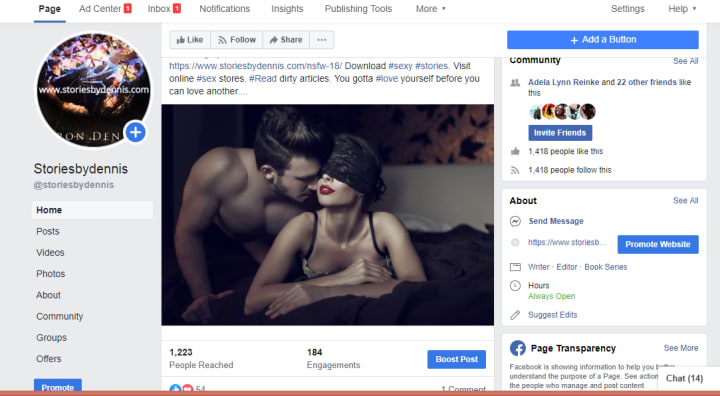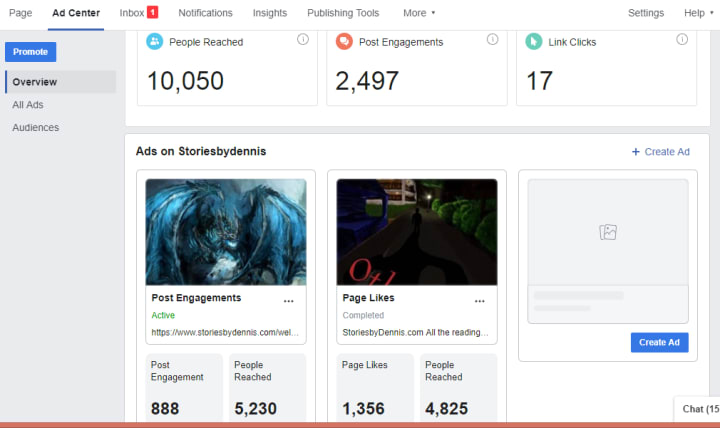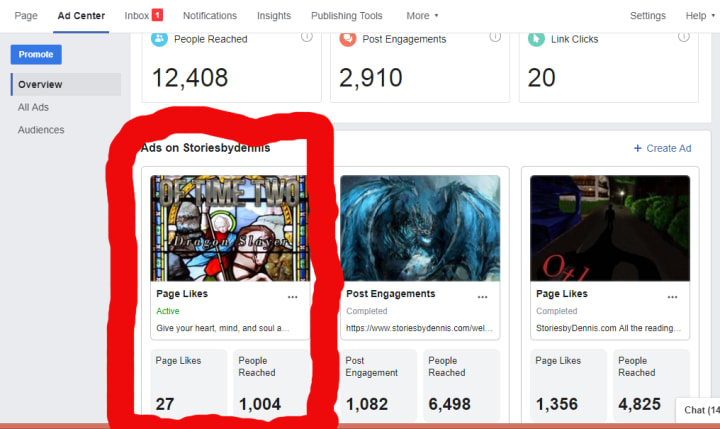You Can’t Buy Internet Success—Part Deux
But What Do I Know?

A little while ago, I posted an article about how content creators can’t buy internet success. You can find that article here.
I went on to show some examples regarding Twitter ADs, or other sites where you can buy “followers,” and how all those purchases don’t result in more sales. I also added at the end of that article that I was going to try FaceBook ADs.
I’ve been running my website, which has pretty much everything and anything to do with some form of writing—stories, novels, editing, marketing, articles, product reviews—for over five years. I’ve been writing books for over eight years, and while I do very well, I’d always like to do better, reach more people, close more sales. As always, quality is key, and so long as I continue to provide my audience with a quality product, service, or information, I’ll continue to do well, but how do I grow my audience in order to do better?
I’m sure everyone else is wondering the same thing. Whether you’re coding video games, illustrating comic books, creating handmade jewelry, affiliate selling, or writing ebooks, you have a target audience in mind, and your financial success depends on growing your audience, as well as maintaining your audience. Maintaining your audience is easy—keep releasing quality content. Growing your audience is a whole different animal. I think it’s a cheetah.

I’m “kittening,” of course; I just like cheetahs.
The truth is that you are not alone in trying to unravel the mysteries of online success. I pulled a few quotes from a Bloomburg article released back in 2015 to help illustrate my point.
“Boris saw that the real opportunities in Web advertising lay elsewhere. In less than five years, he’s built a minipublishing empire, Boris Media Group, largely through the acquisition of cheap—and, often, fake—traffic. Along with MyTopFace, his portfolio includes several low-maintenance properties, such as MaryBoo.com, which offers health and beauty tips to pregnant women. Boris’s LinkedIn profile says his sites combine to reach more than 10 million viewers daily, which would get him in four days what the Los Angeles Times gets in a month.Boris’s traffic number is difficult to verify—he declined to provide a full list of his websites. But for much of the summer, MyTopFace offered from 30,000 to 100,000 ad impressions for sale each day, according to SiteScout.During the interview, he freely admits he buys many of the visitors to his websites. He spends about $50,000 per year buying high-quality traffic for MyTopFace from Facebook (nothing nefarious there—you create an account for your business and then pay Facebook to advertise in people’s news feeds). And then he spends another $50,000 or so on cheap traffic whose origins he isn’t as sure about. Facebook traffic is real people, and costs about 100 times more per visitor than the mysterious cheap traffic.”
You see I italicized and bold faced the real important information.
Boris Media Group buys fake traffic to their sites. Boris Media Group claims to have between 30,000 and 100,000 impressions daily. Boris Media Group spends $50,000 on FB ads every year.
This is important for two reasons. One, I mentioned in the previous article that I was going to try FaceBook ADs because I think they work. Two, it’s imperative to understand what you’re buying when you’re advertising online.
Farther down the Bloomburg article, there’s some great information.
Programmatic advertising has become such a tangle of data firms, marketing firms, strategy firms, and ad tech companies that it can be hard even for the biggest brands to keep track of it all. Three years ago executives at Kellogg started to notice that spots for Cheez-It, Pop-Tarts, and Special K were running on sketchy websites, hidden in pop-under windows, or compressed into screens as tiny as a single pixel. Others were displayed on sites where much of the “audience” was bots.
The situation became more infuriating when Kellogg tried to get a simple breakdown: How much was each part of the labyrinthine digital-ad process costing? Kellogg asked for itemized bills from the various ad agencies and data companies it hired, but they all refused. “It wasn’t a smoking gun,” Kiszka says, “It was more like a detective story where you had to piece together the evidence. And it was clear that in a system with that little transparency, there was bound to be problems.”
There are plenty of website traffic brokers. You can Google “buy ADs for my site,” and you’ll see all kinds of crap promising to get you “organic” or “real” views from humans, but it’s either untrue, or the human who “saw” your AD, never truly saw it; it just registered as an invisible pixel somewhere in order to trick the algorithm into tracking it as a real view. Then, you check your site stats, see you got 10,000 new views, but, uh-oh, no one clicked any links anywhere on your site.
Fortunately, social media sites like FaceBook, Twitter, and LinkedIn keep track of their ADs on their platforms, so you can rest assured that the traffic you get is real, but will you get any traffic?
Around May of 2019, I got a message from FaceBook asking me if I wanted to claim the StoriesbyDennis page as my business page, so I did, and then I began to build on that page, adding pictures, links, information, etc. Since FaceBook has their own ADs, and I see those ADs myself when I’m on FaceBook, and I’ve engaged with those ads from time to time, I thought that maybe a FaceBook AD campaign of my own might be beneficial—beneficial meaning that I could get a bigger return on investment than what I spent on the AD.
My first AD was targeted to FB users who have scifi and fantasy as an interest, and I targeted my whole business page at a global audience. I spent $3 a day for ten days, and these are the results after one week.

As you can see, over 3,500 people were reached, and I got over 1,000 engagements, and something like 1,000 likes. All in all, it was well worth the money, but do you see how I got zero clicks on links? That means that out of the 3,500 people who saw my little slide show AD, and out of the 1,000 who liked my page, no one actually spent anytime on my FB business page, and no one clicked on a link for a buy page for a book, or even a link to a blog post on my website.
That means that that thirty bone I spent didn’t earn any additional revenue. Not so great in that regard, is it?
The following month, I tried to spend $3 a day for ten days on boosting a post. FB has two different kinds of ADs, one that promotes the whole FB business page, and one that allows FB users to “boost” a specific post from the page. This is a screenshot of the post I boosted.

Now, the first time I tried to run the AD, they rejected it, saying that they didn’t allow the promotion of online sex shops or sex toys. Then, I appealed, showing them that Edenfantasys and Jack and Jill have their own FaceBook pages, and they’re allowed to promote, so I wanted to promote, too. A minute later, they approved my post—jackasses.
My post ran for a few days, earning over 1,000 impressions and some 50-odd likes before I got a message asking if I also wanted to promote the post on Instagram. I didn’t have an Instagram account, but since it sounded like a great way to reach more people without spending more money, I agreed, created the account, and the next day my post was removed from both Instagram and FaceBook.
I had spent a total of $6.50 by then, and the boost had done exceptionally well. I actually saw a huge increase on website visitors and clicks to external links, so I was bummed when FB cancelled the AD, but I didn’t feel like arguing with them a second time. Furthermore, I was never charged the $6.50 for the time the AD ran, so I couldn’t really be upset; it was free publicity if only for a few days.
Anyway, since I was still learning how FB ADs function, I decided to boost another post. Back in May of 2019, I had begun to release first draft chapters of a new book, The Dragon of Time 3, Dragon Pact, hoping that by giving my fans something new to read, and for free, they might show an interest in the previous titles, or share my new book with their friends, helping me to reach new fans.
It seemed like a great post to boost. Rather than choosing a global audience, I targeted FB users in California, who have reading as an interest. That’s a 19 million strong audience, and let’s face it, some Hollywood big wigs do have FB accounts, so it can’t hurt to have them see my post.
Unfortunately, the AD’s performance was underwhelming, earning that particular post only five likes. I did get a few clicks on the link, which led to a chapter from The Dragon of Time 3, Dragon Pact. However, all-in-all, for the money spent, I’d have to conclude that that AD wasn’t worth my while.

You can see there that between two ADs I reached about 10,000 people, 2,500 engaged with my FB page, and 17 people clicked a link, so I went back to advertising the whole site; this time, I targeted The United States, with an interest in reading, which is an audience of 93 million.
As you can see, it was also underwhelming.

Those results led to me to try building a following for my FB page first, by promoting the whole page rather than hoping for a following to grow from boosted posts. My thought process became such that by growing the following first, I might be able to receive more organic likes and engagements from posts without boosting, thus attracting more website traffic without having to spend any more money—basically, any FB page with a million followers is going to perform well whenever a post is made, so that’s my current goal on FaceBook.
At this point, in July of 2019, the StoriesbyDennis FaceBook page has around 1,500 likes and followers. According to the ADs results on FaceBook, I’ve basically spent $90 dollars for 1,500 likes, and frankly, I don’t think it’s working out too well. I am going to continue spending about $30 a month to promote the page, and I’m also going to boost a post every once in a while just to see how it fares, but over all, as things stand right here and now, I’d have to spend $50,000 dollars, like Boris Media Group, just to hit a million likes.
So, can you buy internet success?
I’m still going to say no, but what do I know, right?
Maybe, a better question is: Do you have $50,000 to spend on advertising every year? If you do, you might reach ten million likes on your FaceBook page over the course of ten years; it’s only going to cost you a half a million dollars. That’s pocket change, right?

I mean, if major companies are faltering with online ADs—established companies, who have been serving consumers for years—do you really think that you, a single person, can spend a few hundred bucks and blow up overnight? Over a year? You go ahead and buy your ADs or promotional packages, just be wary, and don’t think for a second that a “view” or an “impression” means that a person interested in a product or service such as yours has seen your site, product, or service.
You can certainly help usher your success along by buying ADs, but you have to advertise a quality product or service, and the boost to success is temporary. You also have to target the right audience at the right time with the right AD through the right AD agency. You can’t just boost a random FaceBook update to the wrong audience at the wrong time.
In the end, it all depends on how you define success, though. My first goal was to write a short story. I wrote it, so I was successful in reaching a goal. Then, I wanted to write a book. I did that, too, so I succeeded again. After that, I thought my book was going to get picked up by a mainstream publisher, and it wasn’t.
That was a failure, but I changed my approach and was eventually picked up by an independent press. They didn’t sell my book very well, so that was a failure, too.
What do you consider success? Is success getting and maintaining a steady stream of clients in order to earn a lucrative living? Is success being able to fund a retirement plan? Is success earning just enough money to buy your family a nice vacation once a year without having to work more hours? Is success the freedom to do what you love when you feel like doing it without having to answer to anyone else?
Success can only stand under scrutiny by your definition.
My final piece of advice is to carefully consider your product or service. Really figure out what you want to accomplish online. Then, if you choose to advertise through social media, think about how you use that particular platform. The way you use it might not be the way your target audience uses it, or it might be.
I don’t use Twitter to find new products or services. I don’t use it to look for new people to follow either. Hell, I don’t really even use Twitter at all anymore—not like I used to—because it’s flooded with faux politics and people pretending to give money away through Paypal. I can say something similar for LinkedIn, and I don’t use Tumblr, and I only post to Instagram through FaceBook, but maybe you’re a painter, and you live on Pinterest, Tumblr, and Instagram, but getting more follows won’t necessarily lead to more page views or sales, so experiment, by all means, but keep releasing quality content; you can’t go wrong that way.
Thanks again to everyone for reading, and I hope these two articles about buying internet success have helped to clarify a few issues for you. I really enjoy taking the journey and documenting my results, because all the other crap on the internet about how to become successful online is, well, a bunch of crap—a reason I stress that you also take the time to read the Bloomburg article; lot’s of good intel in there.
Other people are lying to you; that’s the hard truth. Be very, very skeptical of anyone claiming to earn a six-figure income online, or claiming to have a massive online presence. I’m revealing my actual, real-life journey, so that you have a blueprint from which you can build, and if you’re skeptical about me, just check out this article about my experience with Book Vine Press, a publisher and book promotion company, or this one about Farrow Communications.
Keep creating because quitting is the only real way to fail. Be sure to follow StoriesbyDennis on FaceBook, so you can see my journey unfold in real time! Check out my Editing and Free Resources tab, too, for articles like this one—you don’t have to be a writer in order to benefit from my articles about marketing and advertising.
I may also look into Goodreads, Twitter, and LinkedIn ADs just so that I can report their results to you, my loyal followers and content creators. I believe in you.
About the Creator
Aaron Dennis
Creator of the Lokians SciFi series, The Adventures of Larson and Garrett, The Dragon of Time series, and more.







Comments
There are no comments for this story
Be the first to respond and start the conversation.